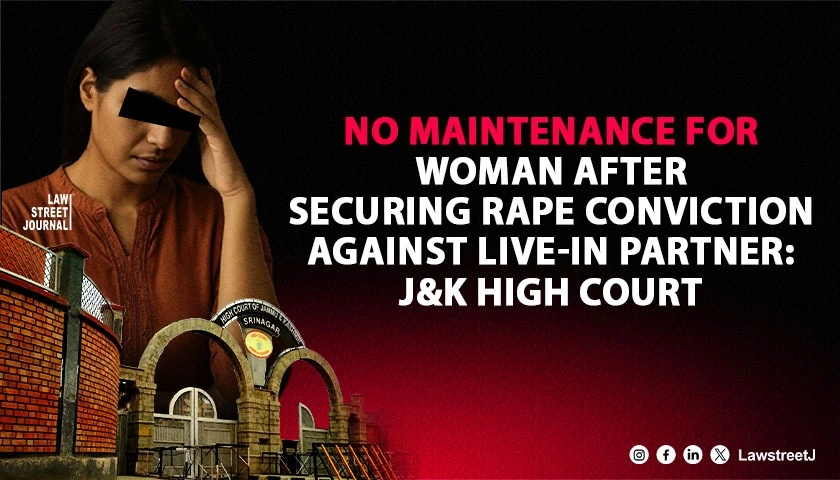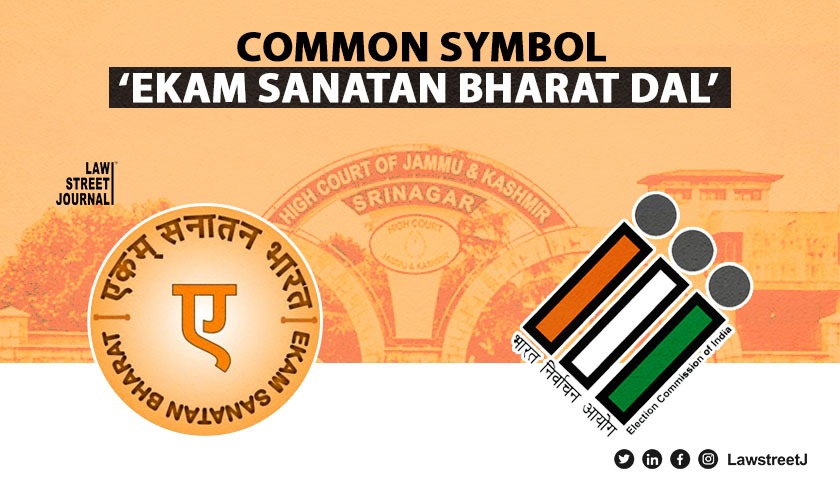Jammu: The Jammu & Kashmir and Ladakh High Court has ruled that a woman who secured a rape conviction against her live-in partner under Section 376 IPC cannot simultaneously claim maintenance from him under Section 125 CrPC, holding that the conviction itself negates the existence of the husband-wife relationship required for such claims.
Justice Vinod Chatterji Koul upheld the Principal Sessions Judge’s decision to set aside interim maintenance granted to the woman, observing that the rape conviction established the absence of the consensual cohabitation required for maintenance eligibility.
The court addressed CRM(M) No. 1022/2022 and CrlM No. 2132/2022 filed by Murti Devi and another petitioner challenging an order dated December 7, 2021, by the Principal Sessions Judge, Kathua, which had set aside the trial magistrate’s grant of interim maintenance of Rs. 2,000 and Rs. 1,000 to the petitioners respectively.
The petitioner claimed she had been allured into a relationship by the respondent, Balkar Singh, who posed as an unmarried man and expressed willingness to marry her. Based on these assurances, she maintained physical relations with him, and they began living together in what she described as a live-in relationship lasting approximately ten years.
During this period, the petitioner became pregnant in 2016 and gave birth to a child. When she repeatedly requested that he formalize their relationship through marriage and grant her the status of a legally wedded wife, he refused and allegedly asked her to abort the pregnancy.
Following his refusal to marry, the petitioner filed a criminal complaint against him with the concerned police station, resulting in his prosecution and subsequent conviction under Section 376 IPC for rape.
Despite the rape conviction, the petitioner then filed a petition under Section 125 CrPC seeking maintenance for herself and her child, claiming she had been living with the respondent as his wife and was therefore entitled to financial support.
The trial magistrate, the District Judicial Mobile Magistrate (T), Kathua, initially granted interim maintenance of Rs. 2,000 per month to the petitioner and Rs. 1,000 for the child through an order dated August 22, 2017.
The respondent challenged this order before the Principal Sessions Court, Kathua, in revision. The revisional court set aside the maintenance granted to the petitioner while maintaining the interim maintenance for the child.
The petitioner’s counsel argued that the revisional court’s order was contrary to established Supreme Court precedents, particularly Chanmuniya v. Virendera Kumar Singh Kushwaha (2011 SCC 141), which held that Section 125 CrPC is a measure of social justice enacted to prevent vagrancy and destitution of women, children, the elderly, and infirm.
The counsel cited Supreme Court jurisprudence stating that “where a man who lived with a woman for a long time, even though they may not have undergone the legal necessities of a valid marriage, should be made liable to pay the woman maintenance if he deserts her.”
However, Justice Koul examined the revisional court’s reasoning, which had observed that “when, on the complaint of the respondent No.1 for commission of rape upon her by the petitioner, the petitioner has been convicted, it cannot be said that the petitioner and the respondent No.1 were living in relationship as husband and wife.”
The revisional court had noted that a husband-wife relationship “imposes an obligation on both the parties to cohabit and to live with each other,” and that there should not have been any complaint of rape if they were truly living as spouses.
Justice Koul agreed with this reasoning, holding that “as the respondent was admittedly charged with an offence punishable under Section 376 IPC on the complaint of the petitioner, therefore, they cannot be treated as husband and wife for claiming maintenance under Section 125 CrPC.”
The court emphasized that living together as husband and wife creates mutual obligations to cohabit, and “if they are living together as husband and wife and have lived years together as such, then living together and cohabiting may not be an offence punishable under Section 376 IPC.”
Justice Koul reasoned that “the offence under Section 376 IPC would arise when such relationship is missing,” suggesting that the rape conviction itself was incompatible with the claim of a consensual marital-type relationship.
The court observed that the respondent’s prosecution and conviction for rape under Section 376 IPC, along with his sentencing to imprisonment, “makes it difficult to hold that he would be liable to maintain and pay expenses for her maintenance.”
Justice Koul concluded that considering the facts and circumstances, particularly while the main petition remained pending decision, the petitioner “would not be entitled to grant of any interim maintenance under Section 488/125 of the Code of Criminal Procedure.”
The court found that the trial court had “fallen in error while granting interim maintenance in her favour” and that the Principal Sessions Judge had “rightly come to the conclusion that petitioner No.1 would not be entitled to interim maintenance.”
Justice Koul determined that “no illegality has been committed by the revisional court while setting aside the order of the trial magistrate so far as it pertains to granting of interim maintenance in favour of petitioner No.1.”
The High Court upheld the revisional court’s order as “well reasoned” and dismissed the petition as being “without any merit.”
Case Title: Murti Devi & Anr. vs. Balkar Singh




![Publicly slapping wife does not constitute outraging modesty: J&K HC [Read Order]](/secure/uploads/2024/02/lj_7549_husband-slapping-wife-publicly.webp)
![Jammu and Kashmir High Court Grants Bail To Gang Rape Accused, Emphasizes Presumption Of Innocence [Read Order]](/secure/uploads/2024/05/lj_6000_5007a767-4748-4bed-9dab-8fa14a4d262b.webp)
![Mere involvement of relatives in anti national activities in the past can not be a ground to deny Govt contracts: J&K and Ladakh HC [Read Judgment]](/secure/uploads/2024/06/lj_3301_79dd6df6-5b62-4057-8762-d0e460af98e6.webp)




